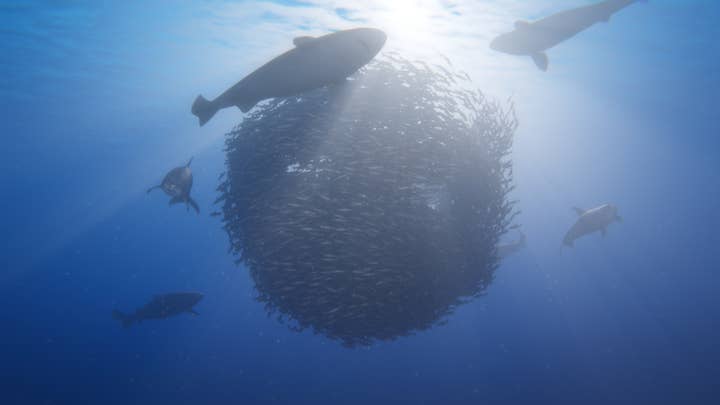Turning a documentary into a video game
The team behind Never Alone discuss its upcoming Blue Planet tie-in with the BBC
When E-Line Media made Never Alone it also created a documentary.
The puzzle platform game was about native Alaskan people, the Iñupiat, and how they have survived for over one thousand years. It was made in collaboration with those from the indigenous community, and picked up numerous awards for the effort.
"We worked with about 30 people from their community to figure out the creative decisions very collaboratively, and we documented that," says Michael Angst, CEO of E-Line Media.

"We decided to put that documentary video in the game itself. So as you play Never Alone, as you achieve things, you can unlock little videos where people from the community are talking about the decisions we made, their culture and so on. It ended up being a very coveted part of the game as a reward system."
E-Line prides itself on creating content with an educational and informative angle, and it's this that caught the attention of the BBC and the filmmakers behind its hit nature documentary series, Blue Planet.
"After Never Alone came out, we got a call from the BBC, which was in the process of making Blue Planet II," explains Angst, who is also director on the upcoming game Beyond Blue. "They had seen Never Alone and thought it would be interesting if we made an original game, but one that could extend the themes that they were doing in this documentary series and possibly reach a different audience with the material. It could also give people the opportunity to step into the role of the scientists that are featured in the series - exploring the world, being on the vanguard and helping us understand how to take good care of our planet.
"The was really the birth of this project. We're doing this in partnership with BBC Studios. We have been working with the production team, the filmmakers, we worked with some of their scientists, and we had the copious footage that they shot for reference. That meant we could choose the story we wanted to tell. This is not a documentary game, but it is based on real-world science and stories that came out of the observations they made while making the series."
"We are unaware of another documentary series that has been adapted into a game"
The demo we played of Beyond Blue suggested it was an adventure game, of sorts, with plenty of room to explore and check out the underwater world and its many inhabitants. However, that wasn't essential. You could, if you wish, play this like any other narrative game experience.
It's certainly an unusual concept for a video game - it's not as if Blue Planet is a licence crying out for a video game tie-in - but Angst observes that it's just the reverse of what the team did with Never Alone.
"We are unaware of another documentary series that has been adapted into a game," he observes. "But again, we're not telling the same story of Blue Planet, but rather we are using it as a jumping off point to tell a story.
"What I think the BBC observed, and what we observed, is that in order to make our last game [Never Alone]... we ended up shooting a documentary. We went through the same process that they had to go through. We worked collaboratively with experts from an area... and we chose to document it so that we would have a video that meant people could understand the context behind all of our creative decisions. The BBC saw that and thought wow, that clearly helped their production process, but it also made for a great combination experience in the game itself.
"So it really was the BBC's idea. We thought it was a brilliant one, and we embraced it. It's a really fascinating opportunity, because we get to work with them on what I think is the most ambitious and beautiful nature series ever created."

E-Line Media is a 40-person team that specialises in these sorts of projects - games that are very much for entertainment purposes, but anchored in the real world. The business was formed ten years ago and even began operating in the purposeful learning environment - which is all about students knowing the purpose behind what they're being taught.
"We spent a number of years on how games can help young people learn design thinking, programming, science... one of the first products we worked with was actually Minecraft," Angst continues. "There were two teachers from a little company called Teacher Gaming. They had got a licence from Notch to be able to mod Minecraft and use it in a school environment. This was pre-Microsoft. We worked with them and helped to develop and distribute Minecraft EDU, which was the predecessor to Minecraft Education Edition.
"For us it was a really eye-opening experience on the value of using a consumer game engine, which had natural engagement, to then repurpose it for a learning environment. Then we had the opportunity to make Never Alone around the same timeframe.
"We get to work on what I think is the most ambitious and beautiful nature series ever created"
"As a company, our strategy focused on where we can make great consumer games, which can get people curious, but then also have the opportunity to extend these games - once they've been successful in the consumer market - into purposeful learning environments. We plan to do that with all of our games going forward."
Beyond Blue is a game created for entertainment purposes first and foremost. It's for those players that enjoy a good narrative-driven game like Oxenfree or Firewatch or What Remains of Edith Finch. But it does have that purposeful learning potential. The team has worked closely with the BBC to ensure the game has that all-important authenticity, and the story will embody the themes found in the Blue Planet series.
"We have a lot of creative control within the boundaries of the story we have set forward and the themes that we have," Angst concludes.
"We look at getting the feedback from the BBC and the filmmakers as an opportunity. Frankly, we'll take as much as we can get. These people just spent years making the most brilliant nature documentaries on the planet. We are trying to embrace getting their feedback, and now that we have made significant progress with the content, we will probably have a much more regular rhythm in terms of working together.
"One of the concerns is making sure it represents authentic science. But they do try to have very strong story-telling aspects in their projects. They do a fabulous job with it. They also really care about demonstrating the beauty and mystery of nature, and not being afraid to drift into policy, advocacy or social issues with their pieces. It is important for us to do something similar. We want to make it a meaningful experience, but at the same time, the ocean has pressure on it. When you talk to scientists about why they're fascinated by their job, it's to be the first person to do this or the first person to go there. But a part of it is also about using knowledge to make the world a better place.
"There's no question that scientists that feel both the weight of doing that and are excited about the opportunity of that. So we embody that with the character decisions we make with the game."
